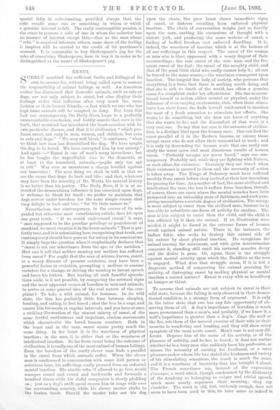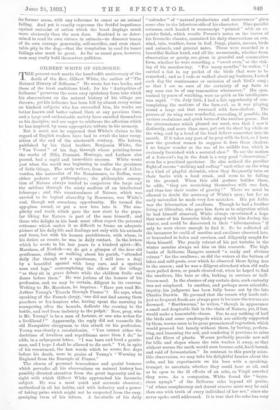ENNUI.
SURELY mankind has sufficient faults and failings of its own to answer for, without being called upon to assume the responsibility of animal failings as well. An American author has discovered that domestic animals, such as cats or dogs, are not only subject to ennui, but also display their feelings under that infliction after very much the same fashion as their human friends,—a fact which no one who has kept tame animals will be tempted to deny. But from this fact our contemporary, the Daily News, leaps to a perfectly unwarrantable conclusion, and boldly asserts that ours is the fault, that mankind has inoculated the beast-creation with its own particular disease, and that it is civilisation "which pro- duces ennui, not only in men, women, and children, but even in cats and dogs." "We may well blush," it continues, "when we think how man has demoralised the dog. We have taught the dog to be bored. We have corrupted him by our society." And again :—" Ennui is one of man's many inventions ; but he has taught the unprofitable vice to the domestic, or at least to the household, animals,—pupils only too apt in evil." Was ever so monstrous a charge levelled against our innocence ! The next thing we shall be told is that we are the cause that dogs do bark and bite ; and that, whatever may have been the morality of Dr. Watts, his natural history is no better than his poetry. The Daily News, if it is so as- sured of the demoralising influence it has exercised upon dogs, is welcome to blush for itself ; we prefer to maintain that dogs sorrow under boredom for the same simple reason that they delight to bark and bite, "for 'tis their nature to."
Nevertheless, our contemporary, in the course of its mis- guided but otherwise most entertaining article, does hit upon one great truth. "If we would understand ennui," it says, once supposed to be the peculiar privilege or punishment of mankind, we must examine it in the lower animals." That is per- fectly true, and it is astonishing how, recognising that truth, our contemporary should have gone so far astray in its conclusions. It simply begs the question when it emphatically declares that "ennui is not our inheritance from the ape, or the ascidian." How can it tell that neither monkey nor mollusc has suffered from ennui P For aught that the man of science knows, ennui, or a weary distaste of present existence, may have been a powerful factor in evolution, prompting a mollusc to assume vertehrte for a change, or driving the monkey to invent speech and learn hie letters. But leaving all such fanciful specula- tions aside, is it not possible, by comparing the outward signs and the most apparent causes of boredom in men and animals, to arrive at some general idea of the real nature of the com- plaint P To take a wild animal, for instance. In its wild state, the lion has probably little time between sleeping, hunting, and eating, to feel bored ; shut the lion in a cage, and assure him his meals at regular intervals, and you have at once a striking illustration of the utmost misery of ennui, of the same fretful restlessness and impatient, aimless movements which characterise the bored human creature. Both in the beast and in the man, ennui means pretty much the same thing. In the beast it is the weariness of physical inaction; in the man, it is either that or the weariness df intellectual inaction. So far from ennui being the outcome of civilisation, it is really one of the most animal of human failings. Even the boredom of the really clever man finds a parallel in the ennui from which animals suffer. When the clever man is condemned to conversation with some dull person or notorious bore, his sufferings really proceed from an enforced mental inaction. His nimble wits, if allowed to go free, would scamper round and round and backwards and forwards a hundred times while his stolid companion is slowly plodding on ; just as a dog's swift speed causes him to range wide over the surrounding country, while his slower master sticks to the beaten track. Should the master take out his dog upon the chain, the poor beast shows immediate signs of ennui, or distress resulting from enforced physical inaction. The chain of conversation weighs just as heavily upon the man, curbing his excursions of thought with a violent jerk, and producing the same malaise of ennui, a feeling of baffled freedom and enforced dawdling. It is, indeed, the weariness of inaction which is at the bottom of all our sufferings in this respect. The ennui of the woman or man who is blas6, oppressed with a weary disgust of their surroundings; the rare ennui of the wise man, and the fre- quent ennui of the fool; the ennui of the naughty child, and that of the good little child who really cannot help it; all can be traced to the same source,—the weariness consequent upon inaction. The languid fine lady of society, who protests that everything is a bore, that there is nothing worth doing, and that she is sick to death of the world, has often a genuine cause for complaint under her affectations. She has so accus- tomed herself to action, either mental or physical, under the influence of ever-varying excitements, that, when those stimu- lants lose their force, she finds herself condemned to inaction for want of a fresh sensation to stimulate her efforts. She wants to do something, but she does not know of anything that she wants to do ; and the discomfort of that want is a very real one. To say that her case is the outcome of civilisa- tion, is a distinct libel upon the human race. One can find the exact parallel of it in the Eastern harems, or among those savage races who do not allow their womankind to work ; and it is only by descending the human scale that one really can study the worst cases and most disastrous results of human ennui. "Probably savages are never bored," says our con- temporary. Probably not, while they are fighting with Nature, or each other, for existence. Certainly they are bored when their existence is assured to them and the necessity of action is taken away. The Kings of Dahomey must have suffered terribly from ennui before they arrived at their last inventions for passing the time. As a matter of fact, the more civilised and intellectual the race, the less it suffers from boredom, though, of course, there are cases where the mental muscles have been pampered into an unhealthy state of flabbiness, and such pam- pering necessitates a certain degree of civilisation. The savage is more subject to ennui than the civilised man, because he is less able to substitute one form of activity for another. The man is less subject to ennui than the child, and the child is less afflicted by it than the animal. If an illustration were needed, it might be found in the extreme forms of human revolt against animal nature. There is, for instance, the Indian fakir, who seeks to destroy this animal side of his nature by sheer physical inaction. He recognises the animal craving for movement, and with grim determination conquers it, standing atill until his tortured muscles decay and the desire is gone. Or, again, there is the struggle against mental activity upon which the Buddhist or the nun is engaged. What does that struggle mean, if it is not a desperate method of conquering the animal yearning for activity, of destroying ennui by making physical or mental inaction a second nature P Ennui is every whit as hereditary as hunger or thirst.
To assume that animals are not subject to ennui in their wild state, because the failing is only observed in their domes- ticated condition, is a strange form of argument. It is only in the latter state that one has any fair opportunity of ob- serving them at all. A dog's impatience of boredom is much more pronounced than a man's, and probably, if we knew it, a wolf's impatience is greater than a dog's. Cage the wolf or the fox, rob them of the natural exercise of their wits or their muscles in wandering and hunting, and they will show every symptom of the most acute ennui. Man's case is not very dif- ferent. Deprive him of the cause of his activity, or of the pleasure of activity, and he too is bored ; it does not matter whether he is a busy man who suddenly loses his profession, or misses the necessity of earning his livelihood, or a mere pleasure-seeker whose life has staled the freshness and variety of his stimulating sensations, the result is much the same, and it is a weariness of inactivity that has brought it about. The French sometimes use, instead of the expression s'ennuyer, a word which, though condemned by the dictionary of the Academy as belonging to vulgar and trivial speech, much more nearly expresses their meaning; they say s'embeter. The word is old, but, curiously enough, does not seem to have been used in this, its later sense or indeed in
its former sense, with any reference to ennui as an animal failing. And yet it exactly expresses the fretful impatience against restraint of action which the beast displays much more obviously than the man does. Mankind is so deter- mined to read its own virtues in animals—to discover traces of its own courage generosity, self-sacrifice, and even chari- table pity in the dog,—that the temptation to read its lesser failings also mast be great. As far as ennui goes, however, men may really hold themselves guiltless.



















































 Previous page
Previous page